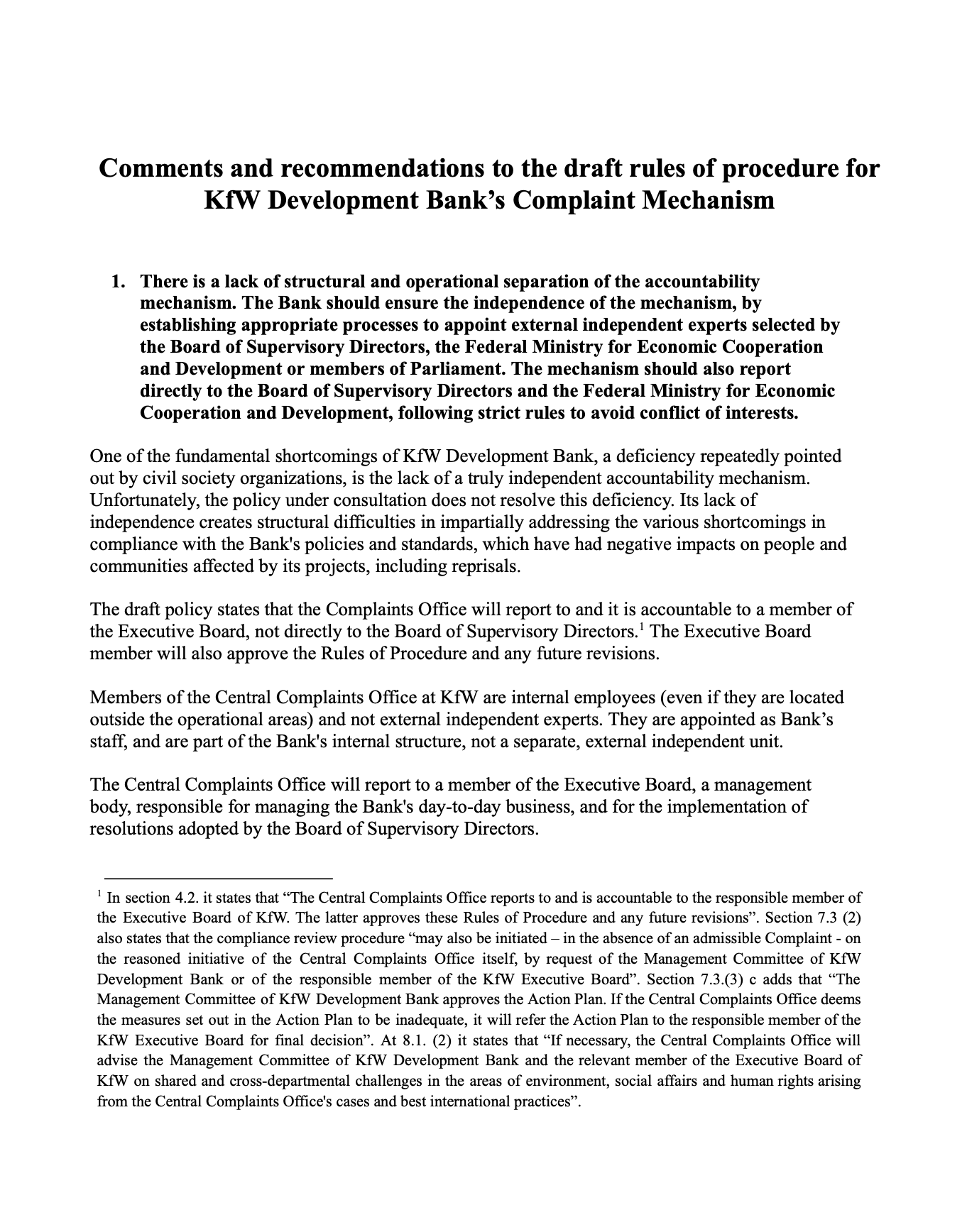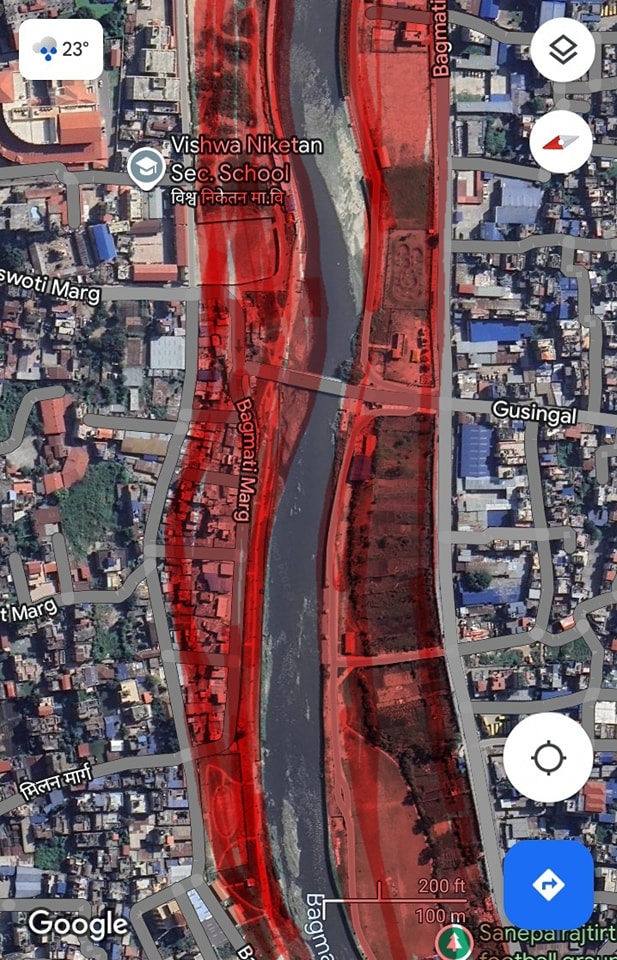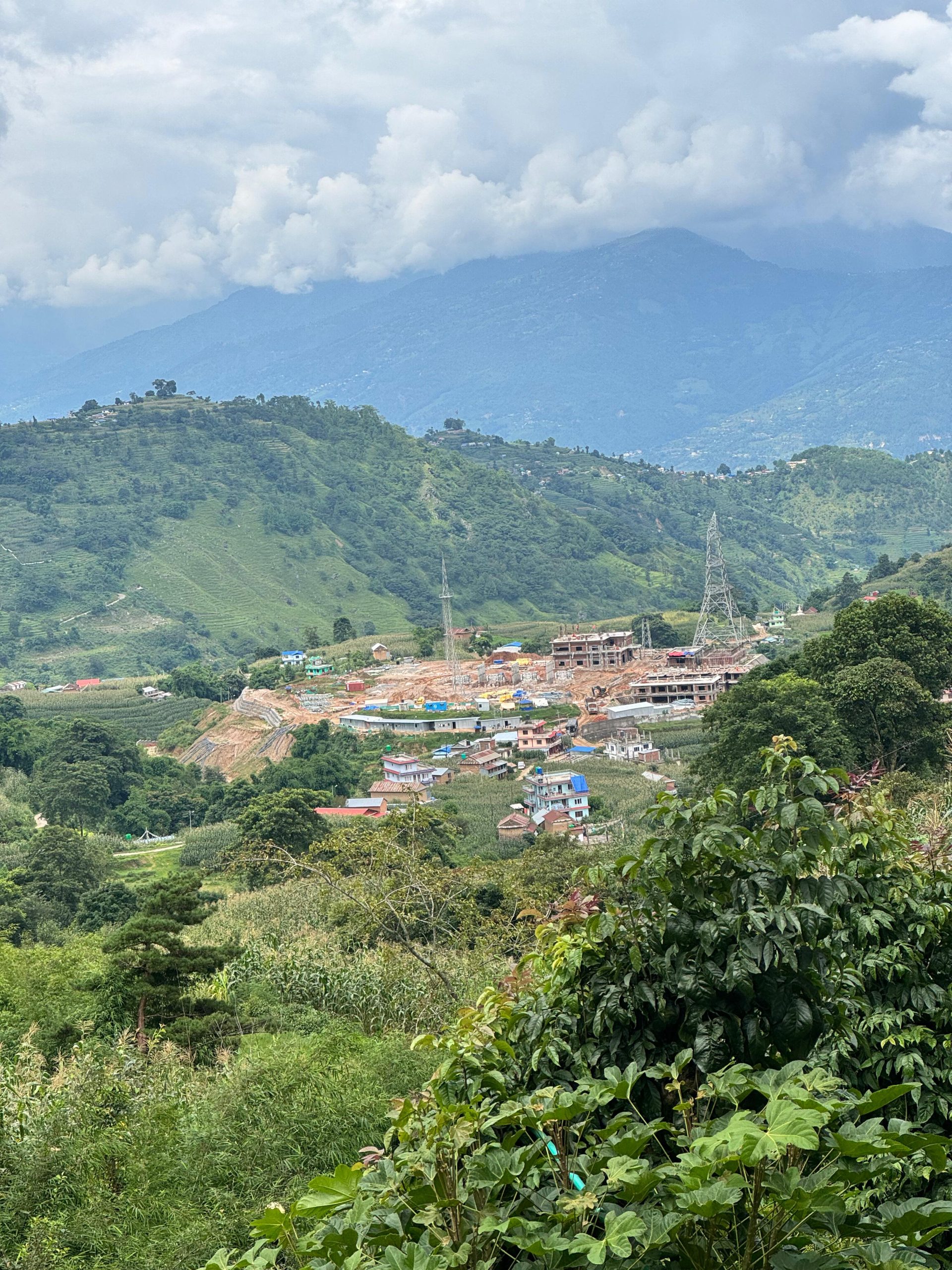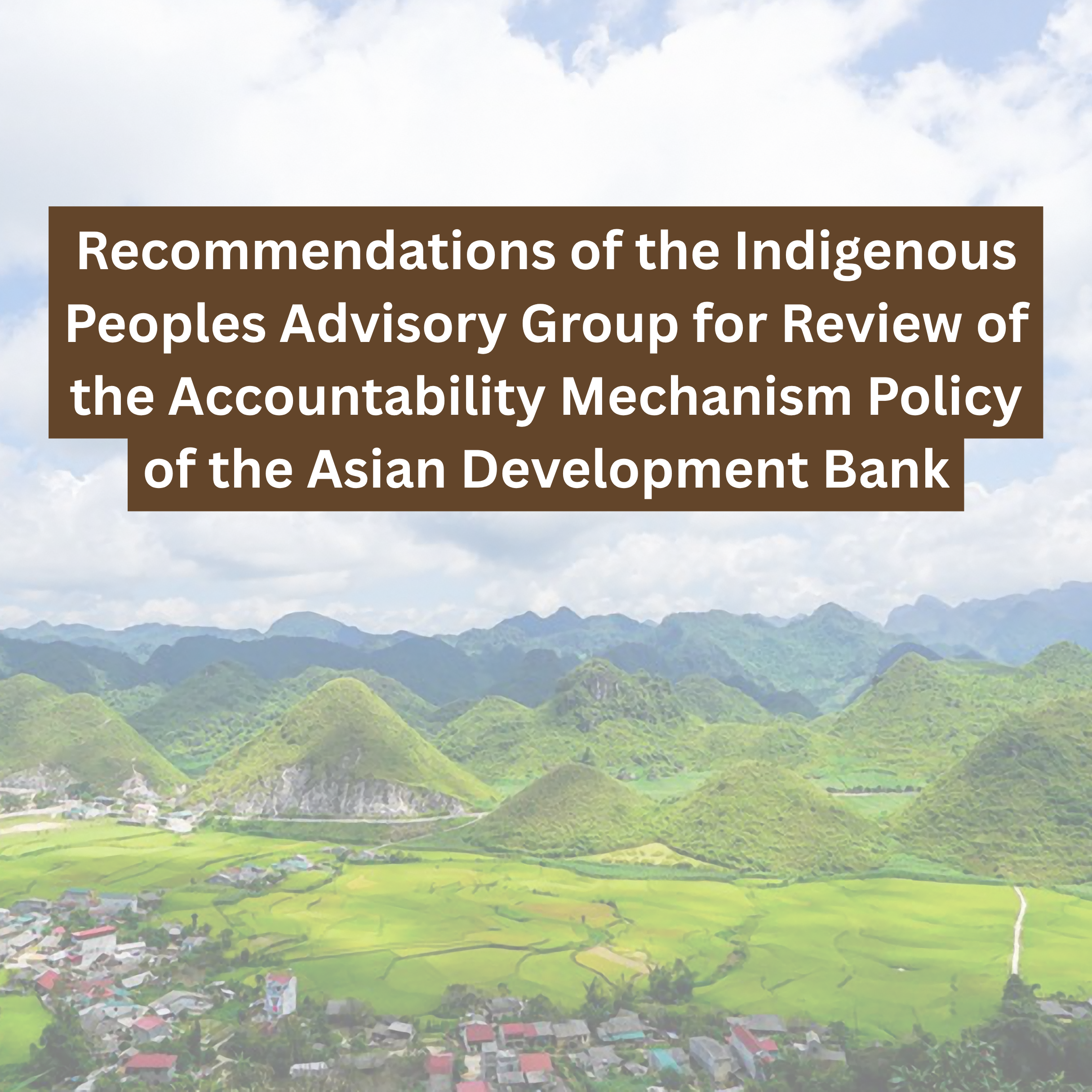On 6 February 2026, CEMSOJ, Defenders in Development campaign and others submitted their recommendations to the draft rules of procedure for KfW Development Bank’s Complaint Mechanism, based on the concerns that emerged in the analysis “KfW: Irresponsible Banking” (September 2025). The submission highlights serious concerns about the lack of independence, effectiveness, and accessibility of KfW Development Bank’s proposed Complaint Mechanism.
more “Recommendations to the draft rules of KfW Development Bank’s Complaint Mechanism”Category: Development Justice Initiative
Indigenous Newa and other communities file complaint with the Asian Development Bank over its financing for projects related to Bagmati and other river corridors
Indigenous Newa and other locals affected by Bagmati and other river corridors across Kathmandu valley have filed a complaint to the Asian Development Bank (ADB) regarding violations of its safeguards in the Bagmati River Basin Improvement Project and other associated projects it finances related to the river corridors.
In a letter submitted to the ADB’s Nepal resident mission on Thursday, representatives of the committees of those affected by the no-construction and buffer zones imposed along the banks of the Bagmati river and its tributaries have called on the ADB for immediate actions to resolve their grievances in relation to the impacts faced by and concerns of the communities along the river corridors, including the following:
more “Indigenous Newa and other communities file complaint with the Asian Development Bank over its financing for projects related to Bagmati and other river corridors”तामाकोशी-काठमाडौं प्रसारण लाइनबाट प्रभावित आदिवासी तामाङ तथा स्थानीय समुदायद्वारा एडीबीको अनुपालन समीक्षा प्यानलमा उजुरी
काठमाडौंको उत्तरपूर्वमा अवस्थित शङ्खरापुर नगरपालिकाको बोझेनीका आदिवासी तामाङ र स्थानीय समुदायले आज एसियाली विकास बैंक (एडीबी) को जवाफदेहिता संयन्त्रको अनुपालन समीक्षा प्यानल (सीआरपी) मा उजुरी दर्ता गरेका छन्। उजुरीमा उनीहरूले बोझेनीमा निर्माणाधीन तामाकोशी-काठमाडौं २२०/४०० केभी प्रसारण लाइन र यसको सवस्टेसन स्थानान्तरण हुनुपर्ने उनीहरुको मागको सम्बन्धमा एडीबीको सुरक्षण नीति र कार्यविधि पालना भएको सुनिश्चित गर्न सीआरपीलाई अनुरोध गरेका छन्।
more “तामाकोशी-काठमाडौं प्रसारण लाइनबाट प्रभावित आदिवासी तामाङ तथा स्थानीय समुदायद्वारा एडीबीको अनुपालन समीक्षा प्यानलमा उजुरी”Indigenous Tamang and local communities affected by Tamakoshi-Kathmandu Transmission Line file complaint to ADB’s Compliance Review Panel
Indigenous Tamang and local communities of Bojheni in Shankharapur municipality in the northeast of Kathmandu filed a complaint today with the Compliance Review Panel (CRP) of the Asian Development Bank’s (ADB) Accountability Mechanism. In the complaint, they have requested the CRP to ensure ADB’s Safeguards policy and procedural compliance in relation to their demands of relocation of the Tamakoshi–Kathmandu 220/400 kV Transmission Line and its substation in Bojheni being forcefully constructed on their lands.
more “Indigenous Tamang and local communities affected by Tamakoshi-Kathmandu Transmission Line file complaint to ADB’s Compliance Review Panel”नागढुङ्गा सुरुङ मार्ग निर्माण आयोजना प्रभावित परिवारहरूद्वारा जापान अन्तर्राष्ट्रिय सहयोग नियोग (जाइका)मा उजुरी
काठमाडौँ, नेपाल
नागढुङ्गा सुरुङ मार्ग निर्माण आयोजना प्रभावित परिवारहरूले आयोजनाका कारण खानेपानी र सिँचाइका स्रोतहरू सुकेको तथा घर र जग्गामा क्षति पुगेको भन्दै जापान अन्तर्राष्ट्रिय सहयोग नियोग (जाइका)मा आज उजुरी पेश गरेका छन्। आयोजनामा जाइकाको वातावरणीय तथा सामाजिक निर्देशिका (JICA Guidelines for Environmental and Social Considerations)को उल्लङ्घन भएको उल्लेख गर्दै उजुरीकर्ताहरुले जाइकाको निर्देशिका परीक्षकहरू (Examiners of the Guidelines)लाई दिएको उजुरीमा प्रभावित परिवारहरूलाई न्याय सुनिश्चित गर्न आयोजनाले निर्देशिका पालन गरे नगरेको अनुसन्धान गरी विवाद समाधान र मध्यस्थताको लागि अनुरोध गरेका छन्।
more “नागढुङ्गा सुरुङ मार्ग निर्माण आयोजना प्रभावित परिवारहरूद्वारा जापान अन्तर्राष्ट्रिय सहयोग नियोग (जाइका)मा उजुरी”Nepal’s Nagdhunga Tunnel Construction Project affected families file complaint with Japan International Cooperation Agency
Kathmandu, Nepal
Nagdhunga Tunnel Construction Project affected families in the northwest of Kathmandu have today filed a complaint with the Japan International Cooperation Agency (JICA) citing impactsof the project on their sources of drinking water and irrigation as well as damages to their houses and lands. In the complaint, they have alleged that the impacts contravene the JICA’s Guidelines for Environmental and Social Considerations and requested the Examiners for the Guidelines to investigate compliance of the project with the Guidelines and mediate to resolve dispute for ensuring remedies to the affected families.
more “Nepal’s Nagdhunga Tunnel Construction Project affected families file complaint with Japan International Cooperation Agency”Joint submission on the human rights situation of Indigenous Newa communities made to the UN for the 4th Universal Periodic Review of Nepal
Community Empowerment and Social Justice Network (CEMSOJ), Save Nepa Valley (SNV) Movement and Thāe Bāe Yā Lwāpu made a joint submission for the 4th Universal Periodic Review (UPR) of Nepal. The UPR is a unique process which involves a review of the human rights records of all UN Member States and is held under the auspices of the UN Human Rights Council. The submission presents key human rights challenges faced by indigenous Newa communities, particularly in the context of “development” and business projects in Nepal and the systematic violations of rights to housing and property as well as cultural rights of the Jugi community within the Indigenous Newa nationality of Nepal. It also examines the compliance of the Government of Nepal with relevant recommendations received during the 3rd and 2nd UPR cycles of Nepal related to the rights of Newa and other Indigenous nationalities.
more “Joint submission on the human rights situation of Indigenous Newa communities made to the UN for the 4th Universal Periodic Review of Nepal”Recommendations of the Indigenous Peoples Advisory Group for Review of the Accountability Mechanism Policy of the Asian Development Bank
July 16 2025
We, members of Indigenous Peoples of Asia and the Pacific, Indigenous rights defenders, and representatives of Indigenous Peoples Organizations, having engaged in the ongoing review of the Accountability Mechanism (AM) Policy (2012) of the Asian Development Bank (ADB) through the Indigenous Peoples Advisory Group (IPAG) present the following preliminary recommendations for the Policy review.
more “Recommendations of the Indigenous Peoples Advisory Group for Review of the Accountability Mechanism Policy of the Asian Development Bank”स्विस सरकारद्वारा भिएफ़एस ग्लोबललाई काठमाडौंस्थित छाया सेन्टर व्यापारबाट जिम्मेवारीपूर्वक सर्न सिफारिस
भिसा फेसिलितेसन सर्विसेस (भिएफ़एस) ग्लोबल विरुद्ध दुई नेपाली संस्थाहरूले दायर गरेको उजुरीको जवाफमा स्विस सरकारको नेशनल कन्त्याक्त पोइन्ट (National Contact Point – एनसीपी)ले भिएफ़एस ग्लोबललाई काठमाडौंको पर्यटकीय क्षेत्र ठमेलमा रहेको छाया सेन्टरसँगको भाडा करार सम्झौता जिम्मेवारीपूर्वक अन्त्य गर्न सिफारिस गरेको छ।
जुरिकमा मुख्यालय रहेको भिएफ़एस ग्लोबल (VFS Global) विरुद्ध २५ अगस्ट २०२४ मा स्विट्जरल्याण्ड सरकारको आर्थिक मामिला सचिवालय (State Secretariat of Economic Affairs) मातहतको जिम्मेवार व्यापार आचरणको लागि नेशनल कन्त्याक्त पोइन्ट (National Contact Point (NCP) for Responsible Business Conduct) मा उजुरी पेश गरिएको थियो। उजुरीमा भिएफ़एस ग्लोबलले छाया सेन्टरमा आफ्नो संलग्नताको लागि प्रभावकारीरुपमा मानवअधिकारको मुल्यांकन (human rights due diligence) नगरेको र छाया सेन्टरमा निरन्तर कार्यालय सञ्चालन गरी आदिवासी नेवा: समुदायको मानवअधिकारमा नकारात्मक असर पारेकोले जिम्मेवार व्यापार आचरणसम्बन्धि बहुराष्ट्रिय कम्पनिहरूको लागि ओइसीडीका दिशानिर्देशन (OECD Guidelines for Multinational Enterprises on Responsible Business Conduct) को उल्लङ्घन गरेको आरोप लगाइएको थियो।
more “स्विस सरकारद्वारा भिएफ़एस ग्लोबललाई काठमाडौंस्थित छाया सेन्टर व्यापारबाट जिम्मेवारीपूर्वक सर्न सिफारिस”Swiss National Contact Point recommends VFS Global to responsibly disengage from Chhaya Center business complex in Kathmandu
In response to a complaint filed by two Nepali organizations against Visa Facilitation Services (VFS) Global, the Swiss Government’s National Contact Point has recommended the company to disengage responsibly from its lease agreement with the Chhaya Center business complex in Kathmandu’s tourist district of Thamel.
The complaint (specific instance) against the VFS Global headquartered in Zurich was submitted to the National Contact Point (NCP) for Responsible Business Conduct within the State Secretariat of Economic Affairs of the Government of Switzerland on 25 August 2024. It alleged failures by the VFS Global to conduct effective human rights due diligence for its involvement in the Chhaya Center business complex and associated human rights impacts on the Indigenous Newar community through its continued operations in the complex in violation of the OECD Guidelines for Multinational Enterprises.
more “Swiss National Contact Point recommends VFS Global to responsibly disengage from Chhaya Center business complex in Kathmandu”



